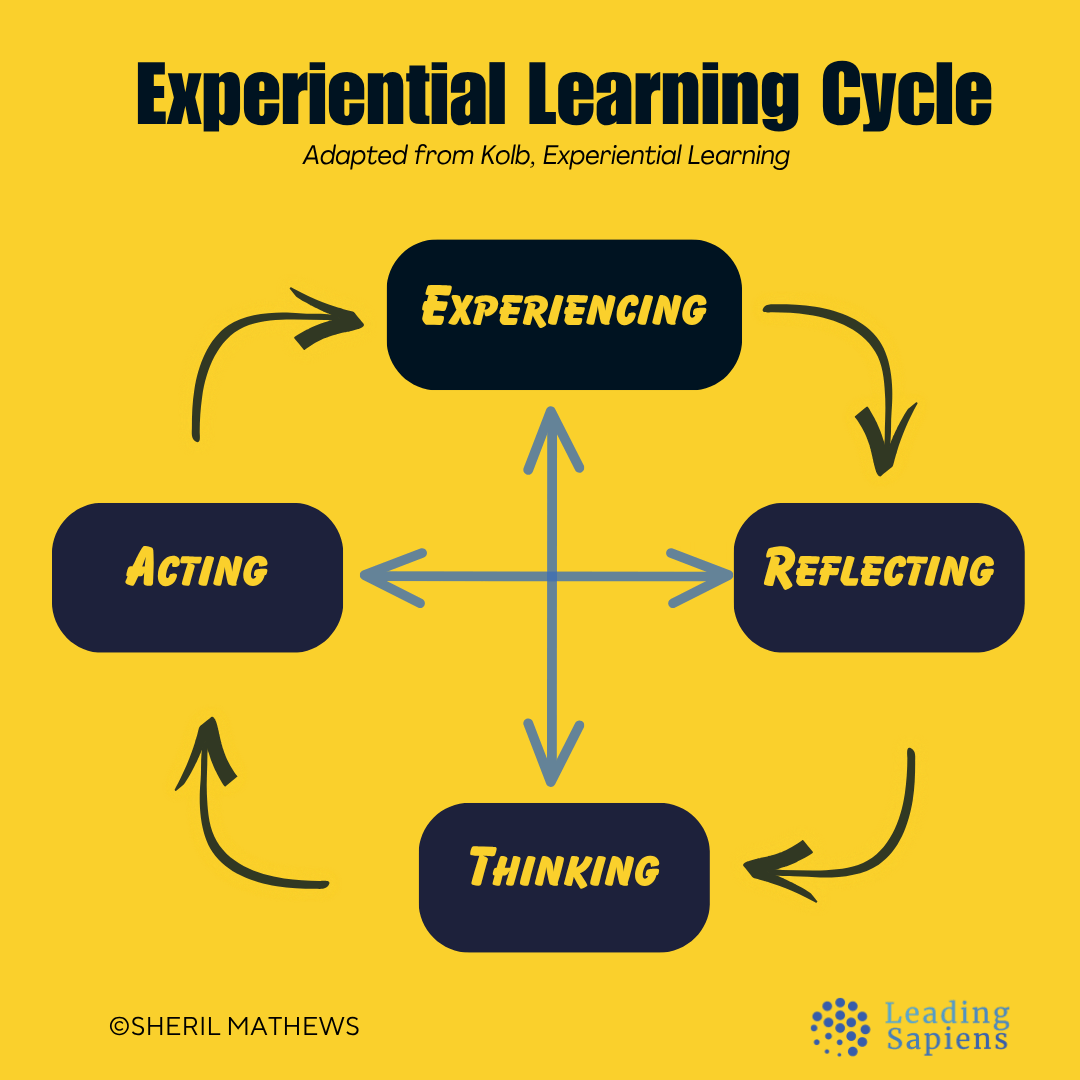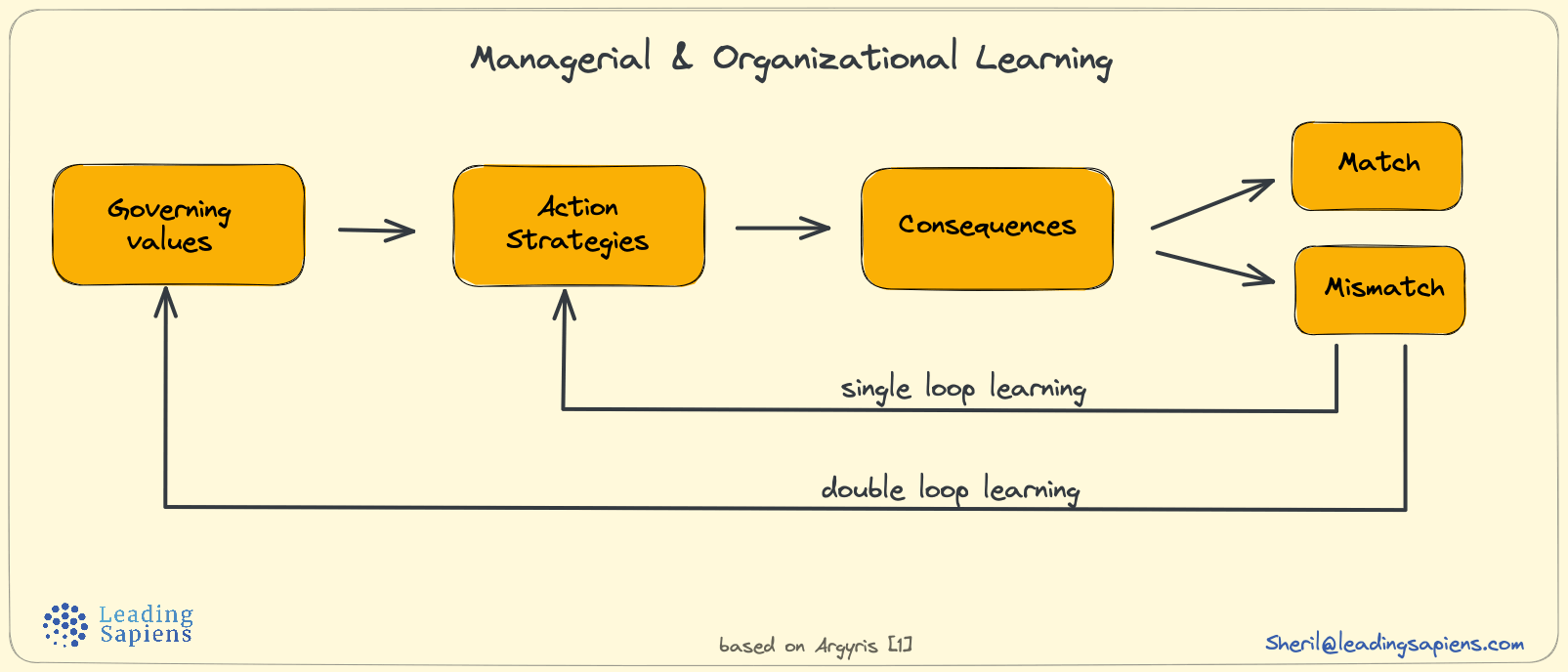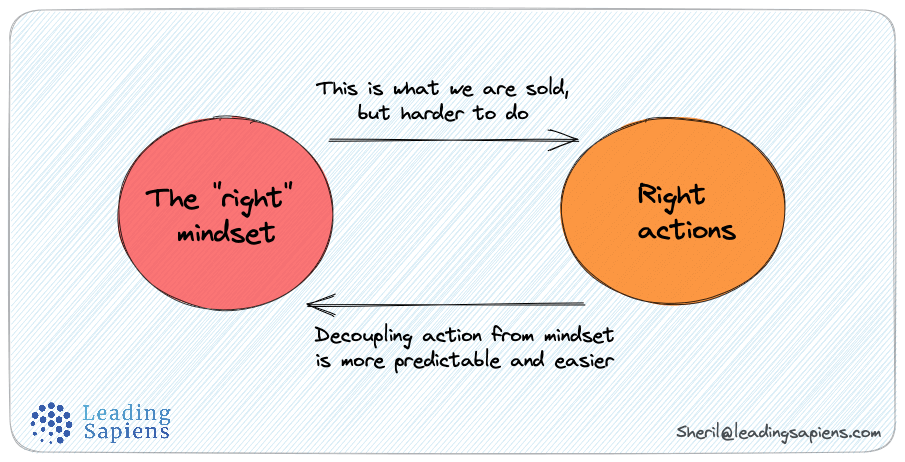Do you consider yourself an effective leader? What about parenting? When you think of getting better at something, what's your first instinct?
Our default approach is to look outside for help. But an equally fruitful and often better approach is to look inside — the natural process of learning from our own experience. Unfortunately, most of us have forgotten how to.
It's because culture programs us otherwise and we want to learn from "other people’s mistakes”. Except when it comes to certain skills, you simply have to learn from your own.
What is experiential learning, how is it different from conceptual learning, and what is its role in improving performance?
Tim Gallwey is one of the intellectual forebears of sports psychology and many modern coaching approaches have their origins in Tim’s methods. There are many aspects to his "inner game" approach but in this article we will focus on two key pieces :
- the difference between conceptual and experiential learning
- the importance of awareness (different from the standard notion of self-awareness in leadership.)
Our need for conceptual learning
When we go about learning something, often we look everywhere else but within — online search, read a book, or find an expert. The underlying assumption being we don’t know the basics or that we can do better if someone taught us. This works for the most part, but also ignores an essential side of learning particularly when it comes to skills like leadership and parenting.
Consider the fact that humans are highly evolved social beings and we could not have survived these many generations without being deft at skills like leadership and parenting. Couple of hundred years back, no one was writing leadership or parenting bestsellers, let alone having access to them. Are today’s organizations and families necessarily better than the ones before? Probably not.
Very rarely do we consider that we might already have the knowhow even if they might not be refined to the level of skills. So why do we look outside by default? Partly because we've been trained to look for what Gallwey calls “conceptual learning”:
Institutional education has overemphasized conceptual learning to such a degree that the value in, and trust of, the natural process of learning directly from experience has been seriously undermined. Based on the assumption that the mind is an empty receptacle that develops as it is filled with facts, conceptual learning is concerned primarily with the accumulation and ordering of concepts and theoretical information.
Paulo Freire calls this kind of learning the "banking" concept of education [4]:
Education thus becomes an act of depositing, in which the students are the depositories and the teacher is the depositor. Instead of communicating, the teacher issues communiques and makes deposits which the students patiently receive, memorize, and repeat. This is the “banking” concept of education, in which the scope of action allowed to the students extends only as far as receiving, filing, and storing the deposits. They do, it is true, have the opportunity to become collectors or cataloguers of the things they store. But in the last analysis, it is men themselves who are filed away through the lack of creativity, transformation, and knowledge in this (at best) misguided system.
For apart from inquiry, apart from the praxis, men cannot be truly human. Knowledge emerges only through invention and reinvention, through the restless, impatient, continuing, hopeful inquiry men pursue in the world, with the world, and with each other.
We take this notion of banking to all areas of learning both in work and life. Conceptual learning also happens to be more attractive and easier to consume.
Reading about writing is a lot easier than grappling with the existential anxiety of staring at the blank screen and actually writing. Consumption of concepts often disguises as learning. The promise of conceptual learning is speedy results and guaranteed outcomes. But this tends to be a mirage, which we often learn from hard earned experience.
It's one reason why you cannot learn leadership in a classroom – it has to be learned experientially in the real world.
Drawing out what's already within
Everybody has leadership potential, some more than others. Same for parenting. We can develop it only if we stop doubting our natural abilities. Preconceived notions about leadership do more to stop you in the tracks than external factors.
Experiential learning has more to do with the development of innate potentialities and skills. The word 'education' comes from the Latin educate, meaning 'to lead out,' and indicates that the potential intelligence sought already exists within us, and needs to be drawn out. This drawing out by a teacher, system or environment is the primary function of true education.
Real world experiential learning coupled with skillful reflection on those experiences is the primary mechanism that makes leadership coaching work. But you don’t need a coach. You can do this yourself by becoming a better observer of yourself.
Leadership as a physical skill
Balanced education requires a proper relationship between cognitive and experiential knowledge, but in the teaching of physical skills, learning through direct experience should take priority over learning through formal instruction in concepts…
…the difference between conceptual learning and experiential learning lies in the difference between a concept and an experience. A concept is a thought or an idea, but it is not the reality it refers to. As such it has its value: it can point the way to a desirable experience, or can warn against an undesirable one. But when any educational process becomes more involved in concepts than in the realities behind them, serious imbalance results.
When Gallwey mentions physical skills he is writing in the context of learning golf and other sports.
We don't tend to think of them as such, but leadership and parenting are physical skills as well. There is clearly a craft and practice element to it, and even more so than the scientific and conceptual — they are more “embodied” than we are prone to think. The mistake is of over reliance on cognitive aspects, meanwhile forgetting about their experiential aspects.
Bear in mind, the concepts we come across were someone else’s experience before they got packaged and become that way.
I sometimes wonder what man’s fate would have been if in the development process he taught himself to understand language before he learned how to walk. No doubt parents would have coached us when to shift our weight from left foot to right, and we would have spent a lot of time on the floor analyzing the causes for falling down again. Undoubtedly many of us would have developed negative self-images about our motor skills and would still be tripping over our own feet.
Instead we learned from experience as a natural process, just as kids teach themselves how to balance on bicycles and skateboards. It is a demanding process that engages one’s complete attention and is enjoyable, although the desired results are not always reached overnight.
The foundation of the Inner Game approach to learning is that experience itself is the primary teacher and each individual must learn to learn directly from his or her own personal experience. Another person’s experience, through teaching and instruction, can be helpful only if it does not compromise a student’s all-important relationship with his or her own direct experience.
Awareness as the key to experiential learning
So how do we get better at experiential learning? One of the crucial pieces is what Gallwey calls "the law of awareness":
In simplest form, this law states that if you want to change something, first increase your awareness of the way it is. In a more concise form: Awareness itself is curative.
Whatever helps to increase awareness of what is will promote learning; whatever hides or distorts awareness of what is will block or distort learning.
And the way we increase awareness is through skilled use of our attention:
Attention is the faculty of focusing awareness and the principal means of increasing awareness. Stated in simplest possible terms, where you focus your attention determines what you learn.
An “awareness instruction,” then, is an instruction to the attention to focus on a particular area for the purpose of becoming more aware of what is there. Unnecessary judgment, fear, or doubt about what is there will distort awareness and thus distort the opportunity for learning.
Awareness is curative and acts as a catalyst in learning only when it's free of judgment. It means to simply focus on what’s happening rather than constantly comparing it to our expectations.
One of the primary characteristics of the awareness instruction is that it is nonjudgmental. Awareness simply sees and accepts what is; it doesn’t place a positive or negative value on the result.
...it’s impossible to be aware of not doing something because awareness can focus only on what is happening. What’s not happening is a concept based on a judgment about what you think should be happening.
Awareness is like light. Whatever it shines on becomes knowable and potentially understandable. Just as focused light brings objects into greater definition and clarity, so focus of attention brings clarity and distinctness to whatever is being observed.
...
Profound understanding requires attending to what lies beneath the visible surface. Likewise, the comprehensiveness of our understanding of any situation or subject depends on the attention given to all its relevant aspects and their relationship to each other. Thus the quality of our attention is linked to the quality of both one's learning and performance.
When we “unlearn” judgment we discover, usually with some surprise, that we don’t need the motivation of a reformer to change our “bad” habits. We may simply need to be more aware. There is a more natural process of learning and performing waiting to be discovered. It is waiting to show what it can do when allowed to operate without interference from the conscious strivings of the judgmental self.
On finding your own technique and relearning to feel:
The more awareness one can bring to bear on any action, the more feedback one gets from experience, and the more naturally one learns the technique that feels best and works best for any given player at any given state of development. Bottom line: there is no substitute for learning from experience.
However, even though we have the ability to learn naturally, many of us have forgotten. And many of us have lost touch with feel. We may need to learn how to feel again and learn how to learn again. The saying of an old master is pertinent here: “No teacher is greater than one’s own experience.”
On awareness as seeing reality:
The essence of awareness skills is learning to see things as they are—that is, nonjudgmentally. When a golfer sees his swing in terms of “good” or “bad” he will not have a clear picture of it as it is. Awareness never judges; only Self 1 does. True awareness is like a flawless mirror; this principle is basic to Inner Game understanding. Awareness is curative only when there is no judgment, and when it is combined with purpose, effective action and learning can take place.
...
It’s important to see the situation in clear detail. Negative judgments tend to obscure your vision of what you wish wasn’t there and to cause doubt and tightening. Positive judgments tend to make you feel it’s unnecessary to see details, and you become too casual.
A formula for peak performance
Ultimately, why should we bother with experiential learning and awareness? Because we want to perform better and operate at even higher levels. And what stands in our way is wrong headed notions about what performance is truly about.
Gallwey proposed a simple formula for performance:
P = p - i
Performance = potential - interference
Often external concepts create more interference and undermine potential.We forget about our inherent potential and do everything to interfere with it, instead of trusting it and letting it blossom.
In the context of leadership and work, Peter Block puts it this way:
High performers are people who simply learn faster. We learn faster when we pay attention and see the world for what it truly is, not for what it should have been. Learning then becomes a function of awareness more than instruction; it is seeing clearly what is happening around you, seeing it without much judgment and without an instinct to control and shape all that you touch.
Learning is retarded in conditions of high anxiety and low acceptance. For most tasks, people have the intellectual knowledge to perform well; they just have a hard time acting on what they know. ...We do not need to learn more from a boss or expert: we need to change the way we apply what already exists within us. Increasing pressure for results is more paralyzing than liberating, even though this idea goes against the conventional wisdom of the culture.
The inner game of leadership and life
Gallwey popularized the notion of inner game approach in sports. But it is equally applicable to leadership and simply life in general. Central to his approach is the notion of two selves, Self 1 and Self 2:
To gain clarity on the mental problems in tennis we introduced the concept of Self 1 and Self 2. Self 1 was the name given to the conscious ego-mind which likes to tell Self 2, you and your potential, how to hit the tennis ball.
The key to spontaneous, high-level tennis is in resolving the lack of harmony which usually exists between these two selves. This requires the learning of several inner skills, chiefly the art of letting go of self-judgments, letting Self 2 do the hitting, recognizing and trusting the natural learning process, and above all gaining some practical experience in the art of relaxed concentration.
When a player comes to recognize, for instance, that learning to focus may be more valuable to him than a backhand, he shifts from being primarily a player of the outer game to being a player of the Inner Game. Then, instead of learning focus to improve his tennis, he practices tennis to improve his focus. This represents a crucial shift in values from the outer to the inner.
This movement of focus from outer to inner is a crucial one — this means leadership or parenting rather than a means to an end become ends in themselves. Rather than trying to get better at them with our default notion of "in order to", they become practices in and of themselves.
In many ways, this inner mastery is a meta-skill that can help improve almost every facet of work and life:
There are always external obstacles between us and our external goals, whether we are seeking wealth, education, reputation, friendship, peace on earth or simply something to eat for dinner. And the inner obstacles are always there; the very mind we use in obtaining our external goals is easily distracted by its tendency to worry, regret or generally muddle the situation, thereby causing needless difficulties from within.
It is helpful to realize that whereas our external goals are many and various and require the learning of many skills to achieve them, the inner obstacles come from only one source and the skills needed to overcome them remain constant.
Related Reading



Sources and references
- The Inner Game of Tennis by W. Timothy Gallwey
- The Inner Game of Golf by W. Timothy Gallwey
- The Inner Game of Work by W. Timothy Gallwey
- Experiential Learning by Colin Beard and John P. Wilson
- Bill Gates talks about the influence of inner game on him: https://www.gatesnotes.com/The-Inner-Game-of-Tennis




